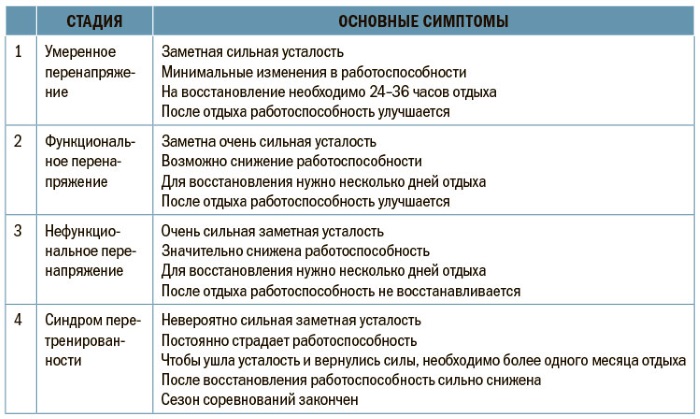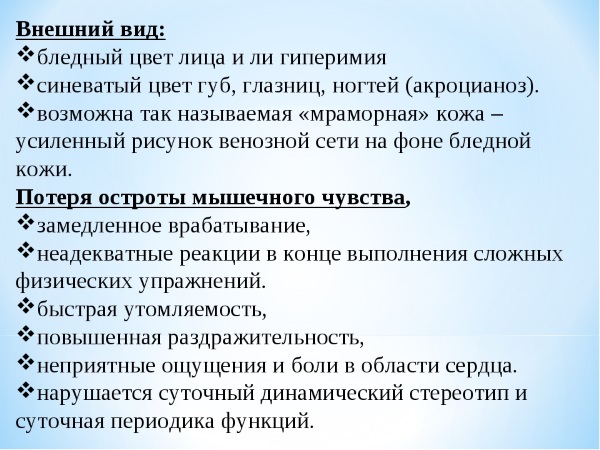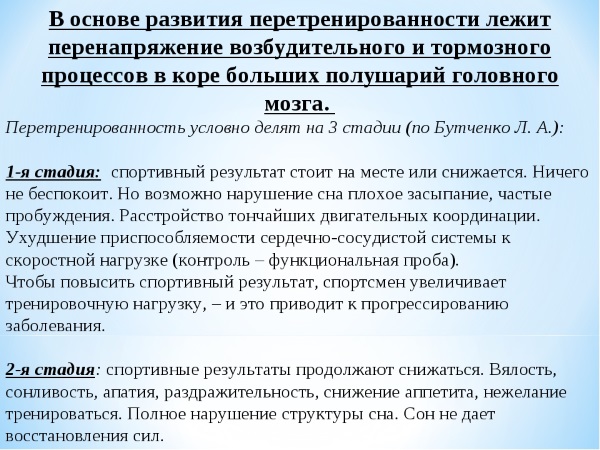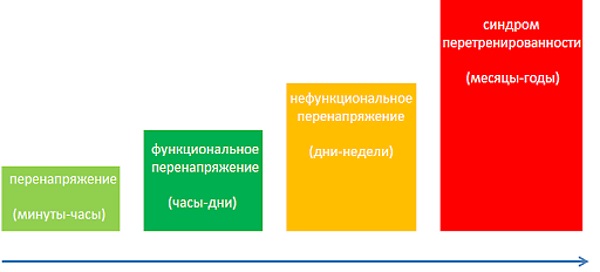Overtraining is a decrease in athletic performance despite continued or even intense training with a partially expressed impairment of well-being. It is a state of physical fatigue that leads to decreased performance and other accompanying symptoms.
Stages and degrees
Overtraining (symptoms, causes and consequences) is a topic that interests not only professional athletes, but also people who are actively involved in sports. Because it is amateur athletes who do not have a number of specialists in nutrition, regeneration and drawing up the correct training regimen who are prone to overtraining.

Stages:
1. Neurotic. This stage is often confused with normal fatigue, as it is usually asymptomatic. The exercising person may occasionally complain of poor sleep. The first stage is characterized by the cessation of the growth of sports results.
Training during the neurotic stage can be continued, but it is advised to reduce the total volume of the load, to exclude long and technically difficult exercises. If you feel better, you can gradually return to your normal workouts.
2. Neurodystrophic. In the second stage, the athlete already has a lot of complaints (general fatigue, loss of interest in training, body weight decreases). Post-workout recovery is slower. Reduced training results. The positive attitude towards exercises disappears, motivation is lost.
It is advised to replace training with active rest for a couple of weeks. Then gradually start exercising. Classes should be planned in such a way that within 1-2 months you come to a regular training regimen.
3. Deep pathological changes. The most severe stage of overtraining. The general condition of the body worsens, the disorders described in the second stage become more pronounced. At the third stage, there may be a ban on training for up to six months, full rest for the first two weeks and active rest for the next 1-2 months are prescribed.
The third stage is considered a neglected option, and is not common. If in the first two stages a person can solve the problem on his own, then at this stage, rehabilitation must be accompanied by the supervision of a specialist. Inpatient treatment is prescribed and specialized therapeutic procedures are performed.
It should be noted that overtraining in people who have just started to play sports is confused with addiction and adaptation of the body to new conditions. Although, after the first classes, when the adaptation process is underway, symptoms appear similar to the first stage of overtraining: muscle pain, a new diet, problems with concentration and sleep.
After a week of regular training, these negative moments will pass, as the body will get used to new loads and endurance will develop over time.
if a novice athlete wants to achieve immediate and great results at once, the so-called preliminary stage of overtraining - overstrain, may occur.

Symptoms
Overtraining, the symptoms of which are quite different, is increasingly common not only among athletes, but also among people who are engaged in any kind of physical activity.
Symptoms of overtraining are decreased performance despite intense and frequent exercise... The body gets a load beyond its capabilities. This lasts for a long period. Overtraining manifests itself in different ways.
The most common signs are:
- chronic fatigue;
- lethargy;
- loss of appetite;
- decreased productivity;
- low pulse;
- high blood pressure;
- general weakness;
- sleep disturbance;
- headaches;
- susceptibility to infectious diseases;
- pain in the musculoskeletal system.

Overtraining, symptoms of which are frequent injuries, bouts of fatigue, can cause depression.
one of the most obvious signs is a lack of performance. That is, when exercise does not give the desired effect (for example, weight loss, muscle gain). On the contrary, the opposite effect is noticeable.
If this is combined with poor concentration, frequent infections, allergic reactions and weakness in general, then this is a signal to the body that it needs rest and recovery.
Loss of muscle mass
Overtraining has many symptoms and can therefore be detected early. But, if body signals are ignored, it can lead to muscle loss. That is, exactly the opposite of what should have been achieved through training. This usually happens due to lack of time to recuperate.
After training, the body needs to be given a break to recover. If the break is very short, then the body does not have time to recover 100%. Then, instead of the regeneration phase, there can be another training session, a new load for the muscles.

Diarrhea
Diarrhea is one of the symptoms of overtraining. This problem is almost always underestimated and is rarely and reluctantly raised among trainees due to the sensitivity of the topic. Stomach cramps and the feeling of having to empty the bowels are also common with overtraining.
This is due to changes in the body. Testosterone levels fall, muscle cells are destroyed, the psyche suffers from too much overload. These changes can have a negative impact on how food is processed in the stomach and intestines.

The reasons
Overtraining is caused by being overworked over a long period of time. It usually occurs with intense endurance exercise and training to develop muscles and gain muscle mass.
What Can Cause Overtraining:
- Workout: the intensity, volume, and frequency of exercise can all contribute to the problem. For example, training too often harder, a sharp increase in volume.
- Diseases and injuries: chronic and acute infections, minor injuries, playing sports, not fully cured, can lead to excessive stress on the body if approached carelessly.
- Lifestyle: nutrition, bad habits (alcohol, smoking), violation of the regime have a negative effect on regeneration and can provoke excessive stress.
- Psychological stress: study (exams), work (strict boss), family (relationship problems) can play secondary roles or be a direct factor in training, planning and rest.
- Environmental conditions: heat, cold, rain, humidity, sun - whether a person is sensitive to the weather or not, the environment has a direct or indirect impact on performance, rest and general well-being.

Prevention
To avoid overtraining, you first need to know your body well. An optimal sequence of exercise and rest is crucial. Nobody can say for sure what kind of break after training should be. You should always respond to your body's own impulses. For example, if you have muscle pain, it is recommended that you refrain from exercising.
As a rule, 24 to 48 hours is sufficient for regeneration after heavy exertion. The stronger the load, the stronger the muscle soreness, and therefore the longer the recovery period. However, this does not mean that strength and endurance training should be completely invisible. Muscle tension must be present.

| Sleep | Food | Reduced stress | Planning |
| Especially after exercising, the body needs to get enough sleep. Sleep provides good rest and prevents overtraining. | Proper nutrition plays an important role. The one who delivers the necessary nutrients to his body after training facilitates and stimulates its regeneration. | To prevent overtraining, you should avoid stressful situations and try to keep your stress levels as low as possible. Stress interferes with proper rest and recovery. | A carefully thought-out training plan so that there is always enough rest time between each load. You need to avoid one-sided loads and add variety to your daily workouts. |
Don't forget to rest after each workout.
How much time does the body need to prepare for the following physical activities:
- Light workout: 5 to 8 hours of rest.
- Intense fast strength training: 24 to 36 hours without sports.
- Long-term strength training: 24 to 48 hours of regeneration.
- Workout to exhaustion: up to 72 hours of rest.
You should always be careful to make the exercises more difficult so that the body can adapt to them. The frequency of approaches should only increase by 10% per week. To make your workout harder, you should choose either intensity or duration. But never all at once. It is best to do less than a quarter of your total training load at maximum intensity.

How to get rid of
Overtraining, symptoms and causes, are often confused with other medical conditions. Symptoms are so diverse that a quick single diagnosis is almost impossible. There is also no specific drug therapy. Treatment with dietary supplements and antidepressants is not recommended.
Pause
If you react immediately and quickly, all symptoms of overtraining may disappear within 1-2 weeks. The best solution is to take a break. Stopping exercise and getting active will help the body return to normal.
Change training regimen
To cope with overtraining, you first need to find out what caused it. Most often, this can be an increase in the frequency of training, a greater intensity of training, a decrease in rest time. All this is included in the training plan or the trainee's regimen. By revising the mode, you can solve the problem.

- Reducing the number of sessions.
- Elimination of long, exhausting exercise.
- Reduction of multi-piece exercises.
- Decreased intensity.
- Replacing a set of exercises. Choose lighter exercises, or exercises of a different kind. For example, those who have been running can go to the pool.
Drug treatment
There is no specific cure for overtraining. But there are some drugs that help the body return to its normal state faster. Substances of plant origin - tinctures of ginseng, Chinese magnolia vine, hawthorn.
Some synthetic and nootropic medications can also help. But before using any medication, you should consult with a specialist so as not to cause unnecessary harm to the body.
Regenerative measures
Instead of training, it is better to rely on massage and a visit to the sauna. Gentle gymnastics and stretching can also help the body recover faster.
Possible complications
Symptoms of overtraining are not immediately noticed. But if the signals of the body are still noticed, measures should be taken and the problem that has arisen should be dealt with. If this is not done, both minor and rather severe complications are possible.

| Gaining excess weight | Although a person who is overweight is advised to get enough intense physical activity to solve the problem, the result may be the opposite. This is due to several factors.
|
| Overtraining syndrome | Intense physical activity with a lack of rest can cause chronic stress. Which, in turn, is associated with adrenal problems. The adrenal glands become depleted and reduce the production of hormones important and necessary for the body. All this leads to overtraining syndrome - impaired appetite, chronic fatigue, violation of the regimen. |
| Women's problems | The body of any woman is at risk if she trains intensively. Even non-professional athletes, without controlling physical activity and rest, can face problems such as:
|
| Decreased immunity | The immune system suffers greatly from constant and excessive physical exertion without rest. When problems with hormonal levels, pain in muscles and joints are added to this, the body is at risk. Any infection or inflammation can grow and develop into serious illness. |
| Heart problems | With frequent endurance exercises for a long time, unpleasant and dangerous consequences such as arrhythmia, thickening of the heart valves, changes in blood pressure, damage to the walls of the arteries can occur. |
| Depression and distress | In the long term, overtraining weighs down the entire body, and therefore the mental state. Lack of success in sports and physical discomfort contribute to depression and personality changes. |
Overtraining and its symptoms can have quite a negative impact on the quality of life of an active person. To avoid this, you need to carefully consider the training process and purposefully give the body time to regenerate.
Without sufficient recovery time, progress will not be made and there will be no positive emotions from the exercise.
Related video: overtraining and how to avoid it
All about overtraining:




